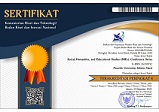SELF-EFFICACY ANALYSIS OF SIXTH GRADE MATHEMATICS LEARNING OUTCOMES IN SD N 7 KEBUMEN
Abstract
The essence of mathematics is aimed at solving everyday problems. However, so far mathematics still a subject that is considered difficult. One factor that influences learning success is self-efficacy. This study aims to analyze the level of self-efficacy of sixth grade students on the results of mathematics learning. The sample in this study were all sixth grade students of SD Negeri 7 Kebumen as many as 20 students. This research is a qualitative descriptive study. Data collection techniques use: (1) Questionnaire; and (2) interviews (3) observations and (4) documentation. The analysis used is descriptive qualitative. The results showed that: Students in sixth grade SDN 7 Kebumen had varying levels of self-efficacy. Students who have a high level of self-efficacy get high mathematics learning outcomes, because they have confidence or self-efficacy and are more persistent in facing difficulties. Students who have low levels of efficacy get less satisfying learning outcomes.
Keywords
self efficacy, learning outcomes, mathematics
Full Text:
PDFRefbacks
- There are currently no refbacks.





